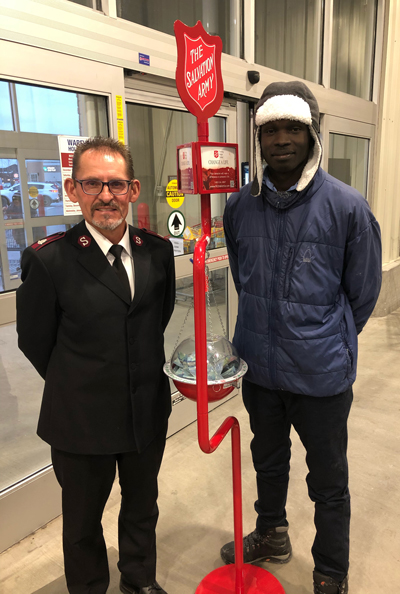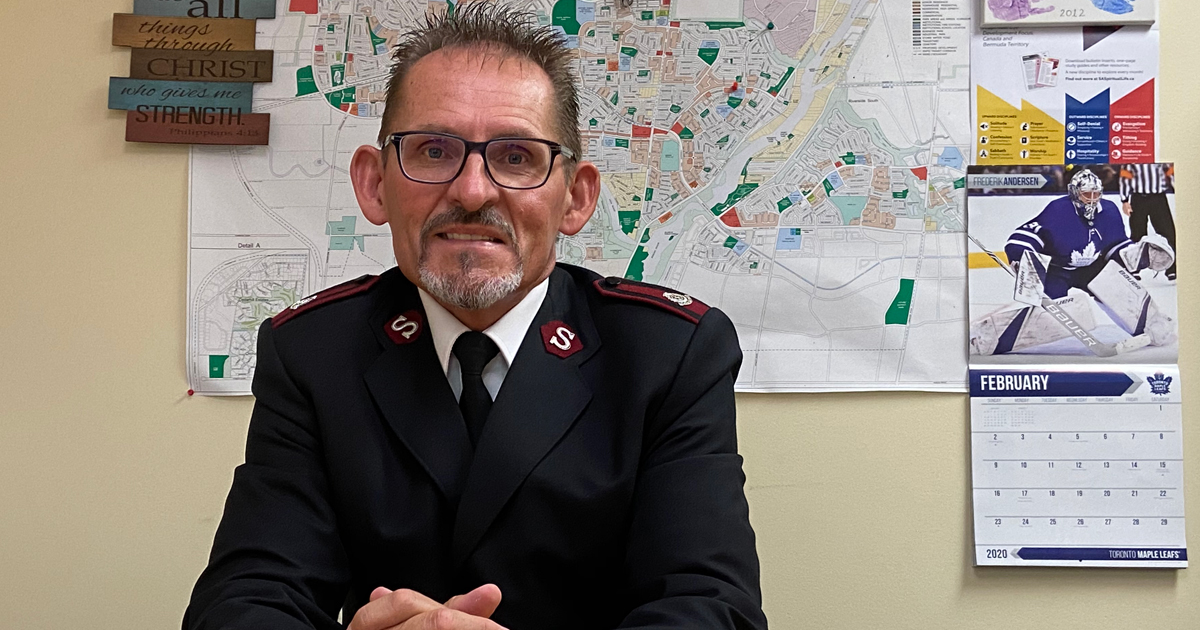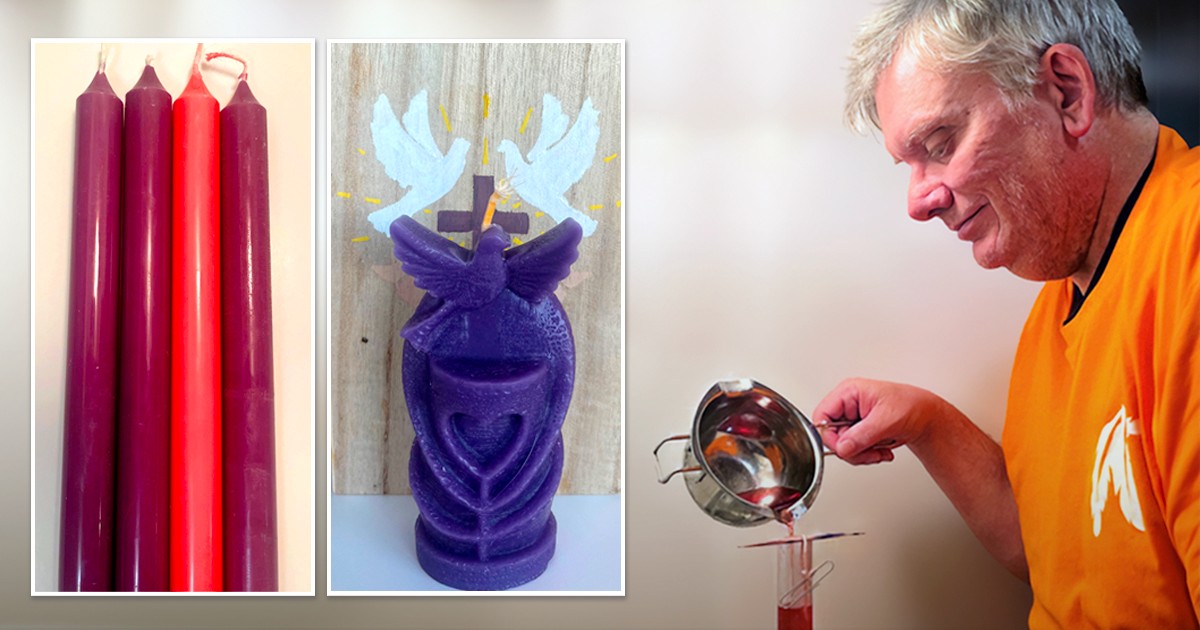(Above) "I will never regard my calling as simply preaching on Sunday anymore," says Major Jim Mercer (Photo: Caroline Franks)
The call came late one Friday evening this past spring from Salvation Army public-relations director Glenn van Gulik.
Salvation Army long-term care facilities were dealing as best they could with the COVID-19 crisis, but the hard-working staff needed assistance.
“Is there any way you can help?” Glenn asked.
He gave me a couple hours to think it over, but I didn’t really need that long.
My wife and I had seen the news and read the headlines, but this was different. Now I was being asked to care for people, some with COVID-19.
I was on the road the next morning.
Reporting for Duty
While I had visited nursing homes many times over the course of my 18 years as a Salvation Army pastor, this would be different. My experience had been purely in a church setting and I had never worked in long-term care.
Arriving at the facility, a dozen of us Salvation Army pastors who had volunteered to serve spent the morning in an intensive training session. We were taught how to put on our gear, including our masks and gloves, correctly, and to discard them for fresh garb each time we left a room.
Almost immediately, my fellow Salvation Army pastor, Lieutenant Ian Robinson, and I were assigned to the fourth floor of the facility.
Hard Week
We were expected to be ready for work by eight o’clock in the morning, and we would leave at around seven in the evening, so we averaged 12-hour days over the week we were deployed there.
We’d meet up with staff, support them and learn from them, and deliver meals to the residents, helping to feed them and give them water, coffee and tea.
The facility was short-handed, and the staff were appreciative that we were there to offer support.
Going from room to room, we’d encounter people at different levels of need. Some could sit up and feed themselves while others weren’t very responsive.
Over the week, we saw some of those people deteriorate, and we witnessed a number of people who passed away during that time. That was very hard for me. As a pastor, I had seen a lot and I thought I was tough, but this was different.
 Major Jim standing at a Salvation Army kettle last year with Both Chuol Gakah, a new Canadian from South Sudan
Major Jim standing at a Salvation Army kettle last year with Both Chuol Gakah, a new Canadian from South Sudan
In the days I was at the facility, I spent a fair amount of time with a retired Salvation Army officer, Major Ann Murray.
The staff always referred to her as “Major Ann” and treated her with dignity, as they did all the patients.
My time with her was precious. I have never met anyone who appreciated a cup of cold water as she did. She had stopped eating days before, but she was alert and looked everyone in the eye. Each time I gave her a drink, her response was, “Aww, that was good. Thank you.” She was courteous with everyone she encountered.
There was one morning in particular that was very emotional for me. Major Ann was in some discomfort and asked for a nurse. Then she said, “Don’t leave me.”
I responded with, “I won’t leave you, Major Ann.”
I then prayed with her, quoting Psalm 23 as well. It was amazing to hear her echoing my words with, “Amen, amen, thank you, Jesus.” As the nurse came in to help, she turned to me with a thank you and said, “You should be very proud of what you are doing.” Her words of affirmation were a divine moment for me.
Mixed Emotions
The journey from room to room was physically and emotionally tiring for us, but we saw it as a privilege to serve.
These patients were not permitted to see anyone from the outside, so we became their family. We’d point to pictures on the wall and ask: “Is that you playing piano there?” They would nod their head and I’d respond, “Wow, you obviously love music!” Or I’d ask them the names of their children. It wasn’t a conversation in the normal sense as most could only nod and smile or say one or two words. But they were moving interludes for all that.
As I left for the last time that Sunday, I intentionally went around to every room to tell them that this was my last shift.
“You’re leaving?” some said. “What are we going to do now?”
“The Salvation Army is going to send in more people,” I’d answer. “You don’t need to worry.”
I walked out of the facility with mixed emotions. Part of me wanted to stay, although I knew I had family at home, and ministry I needed to get back to. However, I knew other Salvation Army pastors would take my place.
A Ministry of Presence
No other experience I’ve had compares to that week. It changed my life.
I will never regard my calling as simply preaching on Sunday morning anymore. I’m humbled by the fact that I was called and I responded. The faces and the names of the residents I served, along with the amazing staff on the fourth floor, will forever be etched on my mind, especially Major Ann.
It is often said in The Salvation Army that we are called to be the hands and feet of Jesus on earth. My fellow Army pastors and I actually lived that out that week.
We were a ministry of presence for those we looked after and for their families who depended on us, individually and as an organization. I didn’t take that trust for granted, and I never will.









Comment
On Monday, November 2, 2020, DON & BRENDA HUMBY said:
On Thursday, October 22, 2020, Darlene said:
On Thursday, October 22, 2020, Grace said:
On Wednesday, October 21, 2020, shirley godfrey said:
On Wednesday, October 21, 2020, Joyce Stevens said:
On Tuesday, October 20, 2020, Maxine Reid said:
On Tuesday, October 20, 2020, John Ploughman said:
On Tuesday, October 20, 2020, Cathy Harris said:
On Tuesday, October 20, 2020, Stuart Westcott said:
On Tuesday, October 20, 2020, Major Dolores Abbott said:
On Monday, October 19, 2020, Brenda Morrison said:
Leave a Comment